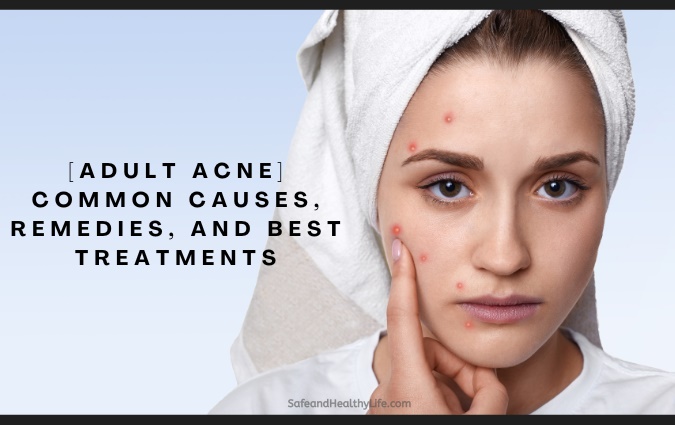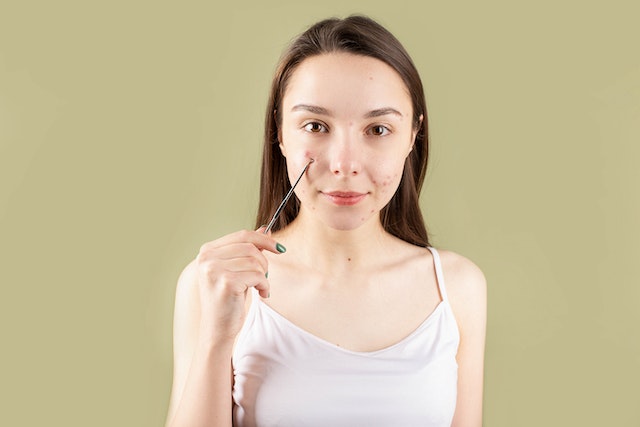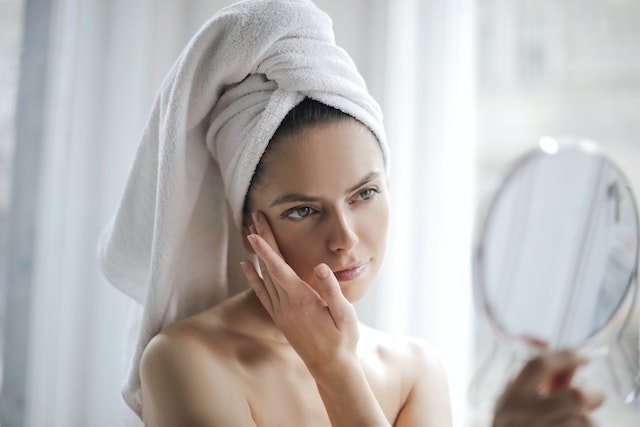[Adult Acne] Common Causes, Remedies, and Best Treatments

Typically, acne only occurs in the teenage years, and as you approach your twenties, it reduces and disappears.
However, some people continue to get zits throughout their lives, and it can be stressful to deal with every day.
Adult acne is a widespread phenomenon; even though it is not a severe medical condition, it can affect appearance and self-confidence.
Usually, adult acne is a result of hormonal imbalance that results in excess sebum in the oil glands in your skin.
Increased sebum production in the skin can clog pores and lead to pimples, blackheads, or whiteheads.
What are the Best Treatments for Adult Acne?
The best treatment for your acne depends on your skin, age, and the severity of your acne. However, some treatments are usually recommended.
Here’s a look at the most commonly prescribed adult acne treatments:
- Medication – There are several medications for acne, including topical medicines like gels, creams, and face washes. Most topical medicines for acne contain benzoyl peroxide, clindamycin, azelaic acid, and retinoids. In some cases, dermatologists may prescribe oral antibiotics like tetracyclines and azithromycin. Most of these medicines are available over the counter, but using any medication for acne is not advisable without consulting a doctor.
- Comedone Extraction – To combat mild forms of acne, dermatologists use specialized tools such as the comedone extractor. The doctor uses it to remove blackheads in a sterile environment.
- Chemical Peels – Chemical peels use plant-based extracts and mild acids to enable controlled skin exfoliation. Using a chemical peel on adult acne helps remove dead skin and bacteria from the surface to heal acne.
Common Causes of Adult Acne

Photo Credit: Pexels
At the heart of it, acne is caused by clogged pores. External factors like dust and pollution can sometimes clog the pores of the skin, causing a sudden acne breakout in adults.
In other cases, internal factors like hormonal imbalances may lead to acne in older adults.
Some of the most common causes of adult acne are listed below:
- Hormonal Fluctuations – Adults go through hormonal fluctuations due to various reasons. If any hormone level change increases sebum production in your skin, it can lead to acne. Hormonal fluctuations are most likely at these times:
- At the periods
- During or after pregnancy
- During perimenopause and menopause
- When starting or stopping using hormonal birth control
- Stressful Lifestyle – Those who experience chronic stress produce an excess of cortisol – also known as the stress hormone. Excess cortisol in your body can start showing adverse effects on your skin. Cortisol may create a favorable environment for bacterial growth on your skin, resulting in adult acne on the chin, neck, chest, or back.
- Pollution – An increasingly common adult acne cause is pollution. Exposure to excessive air pollution and UV radiation can clog the pores of your skin with dirt and grime. You may get acne if you allow your skin pores to remain clogged and unclean for a long.
- Using the Wrong Products – When buying skin care products, look at the product description to see if it suits you. Those who have naturally oily skin should always choose water-based or noncomedogenic products. Such products will not increase oil on your skin and keep your pores clean.
- Incorrect Cleansing – Sometimes, adult acne is caused by over-washing your face. Cleansing your face is a good practice, but overdoing it can leave your skin dry and sensitive. Choose a gentle cleanser, and don’t wash your face more than once or twice daily.
- Food Allergies – Doctors say there is no scientific proof that eating certain kinds of food can cause an acne breakout. But everyone is different, and you may notice a pattern or connection between your diet and acne. Observe your skin; if certain foods trigger your acne, try to avoid those foods.
- Certain Health Conditions – Some conditions may cause hormonal fluctuations leading to adult acne. One example of such a health condition is polycystic ovary syndrome (PCOS) – which causes hormonal imbalances and acne. Also, taking medicines like corticosteroids, lithium, or androgens may also cause acne as a side effect.
- Genetics – Like most skin conditions, genetics may also cause acne in adults. If your parents, siblings, or grandparents had acne till adulthood – you might also get it. Even though genetic factors cannot be controlled, you can adopt a skin care regimen that minimizes acne and keeps your skin healthy.
Recommended Adult Acne Remedies

Photo Credit: Pexels
As mentioned above, the best remedy for acne depends on your skin and the severity of the acne spread.
Here is a look at some of the most popular remedies for adult acne healing:
- Simplify Your Skincare Routine: A daily skincare routine can help prevent acne breakouts. But remember to keep it simple, easy to sustain, and apply only the products you need. Applying too many products may have a counter-effect on your skin.
- Check Your Diet – If you feel that certain foods are likely to trigger an acne breakout on your skin, avoid them. Some examples of acne-causing diets include foods with a high glycemic index, such as processed foods and high-sugar-load foods.
- Try Yoga – Yoga is a workout that combines the strength of your mind and body. It helps you destress and improves hormonal balance in your body. Try yoga and meditation to improve your lifestyle and reduce stress – and it may help reduce your skin problems too
- Light Therapy – Light therapy uses red and blue lights to have anti-inflammatory effects on your skin. It also reduces the growth of bacteria on your skin to heal acne. Remember to keep your eyes protected.
- Don’t Pick – Picking at your acne will do more harm than good. In worst cases, picked acne can leave scars on your skin. Trying self-treatment by squeezing your acne can worsen the spread by allowing the bacteria to multiply.
- See a Dermatologist – If you have been dealing with adult acne or struggling with rosacea for two months or more and none of the products seems to be working – it’s time to see a dermatologist. They are the experts for adult acne and can recommend the best medication for your skin condition.
Acne is not dangerous or painful, but it can be detrimental to your day-to-day life by making your skin uncomfortable or interfering with your appearance.
Although home remedies are usually effective, don’t hesitate to see a doctor if your acne is not responding to any remedy.
At MedsNow, you can consult expert dermatologists for adult acne and order the medication online. The medicines are delivered to your doorstep.
About The Author:
Anne Kamwila is a freelance content writer and a digital marketer. She is passionate to write about health, technology, and business-related guides, news, and books.

